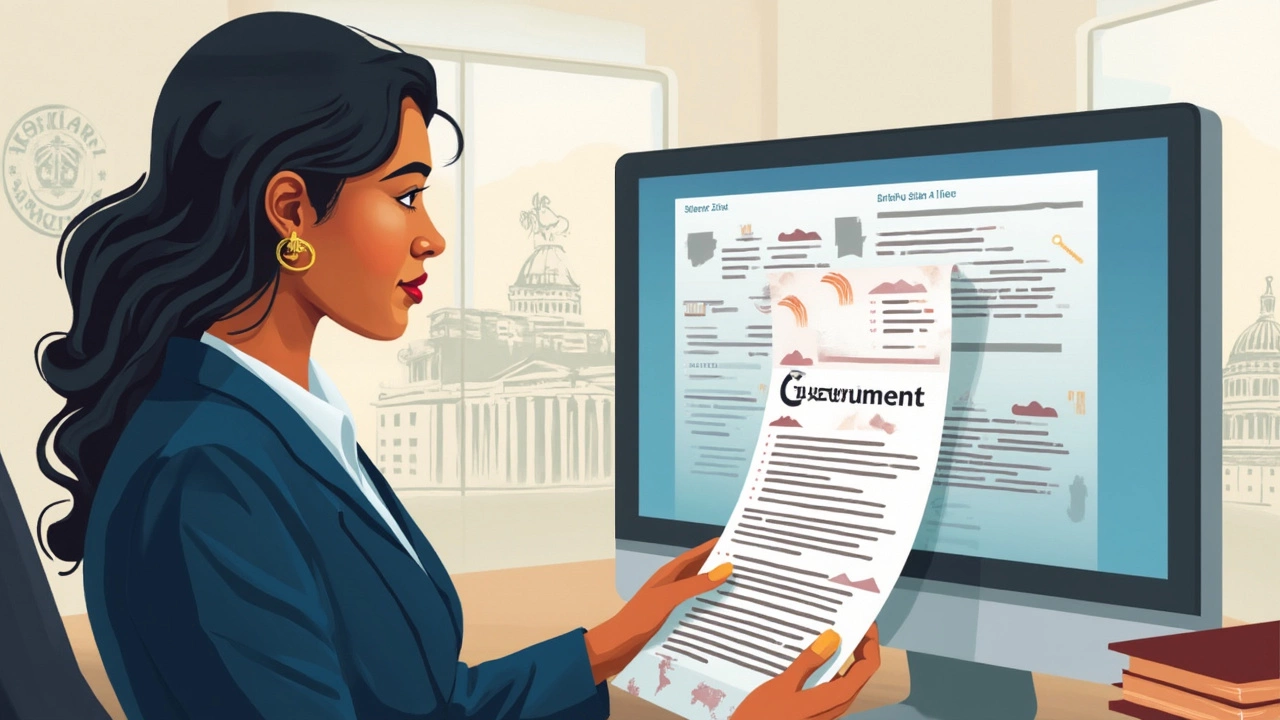GS 9 level experience keeps popping up in federal job listings, but what does it actually mean? If you're chasing a government career, this is one hurdle you can't ignore. GS stands for 'General Schedule,' which is the pay scale the U.S. government uses for most office jobs. GS 9 is kind of like the crossing point between entry-level and mid-level roles—you're past the basics, but you don't need to be a lifelong expert yet.
If a job asks for GS 9 level experience, they want to see that you've done more than just the routine stuff. Think: problem-solving, working independently, running small projects, or training others. It's not enough to just show up—you need to show results. Most people hit GS 9 with a few years of hands-on work, sometimes with a master's degree, or three-four years after their bachelor's if they're learning on the job.
Here's a tip: When you see "GS 9 level experience" on a job ad, break down your past roles. Did you make decisions that mattered? Did people count on you to lead or solve tricky problems? If yes, you're probably stacking up the right kind of experience. If not, now's the time to start looking for chances at work that let you take charge or handle more complex assignments.
- What Is GS 9 and How Does It Fit the Pay Scale?
- What Counts as GS 9 Level Experience?
- Tips to Show You Meet GS 9 Standards
- Myths and Real Talk About GS 9 Hiring
What Is GS 9 and How Does It Fit the Pay Scale?
If you’re eyeing a career in the federal government, you’ll keep seeing “GS” pop up in job ads. It stands for General Schedule, which is the main pay system for most white-collar federal jobs in the U.S. There are 15 big levels, from GS 1 (pretty much the starting line) all the way up to GS 15 (top of the ladder before you get into executive positions). So, where does GS 9 sit?
GS 9 is that sweet spot when you’re no longer the new guy, but you’re not calling all the shots yet. It’s the first pay grade where jobs start to expect you to work on your own sometimes, tackle trickier problems, and maybe help guide coworkers who are newer than you. If you’re moving up from GS 7, this is your next big step.
Here’s a quick look at some typical pay numbers for the GS 9 level in 2025, before any local adjustments (these can boost your pay if you work in high-cost cities):
| Step | Base Pay (USD) |
|---|---|
| 1 | $53,140 |
| 5 | $59,120 |
| 10 | $68,484 |
That’s just base pay—the real number is usually a bit higher after local adjustments. Want to get an edge? Big cities like Washington, DC or San Francisco often pay 20% or more on top.
You don’t get to GS 9 just by sticking around. You need a combination of experience, education, or both. In most cases, a master’s degree, or at least one year of specialized experience in your field, matches the GS 9 expectation. Federal announcements even spell this out: they’ll ask for “one year of specialized experience equivalent to the GS 7 level.” That means you handled tasks that were more challenging, and you showed you could work with less handholding.
There’s no guessing game with the pay—each GS level is public, and it comes with 10 steps, with small pay bumps as you rack up years in the same grade or do a solid job. Moving from step 1 to step 10 can really add up, so check official tables to see what you’d actually get in your hometown.
What Counts as GS 9 Level Experience?
The phrase "GS 9 level experience" trips up a lot of job seekers, but it really just means work that goes beyond the basic stuff. The government is looking for people who can handle moderate responsibility and solve problems without much hand-holding. You don't have to be a manager, but you should have been the go-to person for certain tasks or projects.
In practical terms, here’s what usually fits the bill for GS 9 level experience:
- Planning and leading smaller projects or parts of larger ones
- Analyzing data and making recommendations
- Training or guiding less experienced team members
- Handling technical work or paperwork without being micro-managed
- Having your work reviewed just for results, not for every little step
- Troubleshooting problems and figuring out solutions on your own
You’ll usually see requirements like "one year of specialized experience equivalent to at least the GS-7 level." That means you need a track record of doing tougher, more independent work than entry-level jobs. Employers aren’t just looking for time spent, but what you did with that time.
Here’s a quick side-by-side to show the jump:
| GS 7 Level | GS 9 Level |
|---|---|
| Follows clear instructions | Develops plans and improves processes |
| Needs regular supervision | Works independently, guidance only when stuck |
| Supports projects | Leads projects or key parts |
| Handles routine tasks | Solves new or tricky problems |
Other ways to qualify can include a master’s degree or two years of graduate study in a field tied to the job. But real-world experience usually grabs more attention, especially if you can show you’ve led the charge on something important at your workplace.
If you’re aiming for GS 9, start documenting your wins at work now—who did you help, what problems did you solve, and what’s a specific outcome you can point to? Recruiters eat up those details. Keep it concrete and numbers-driven wherever you can.

Tips to Show You Meet GS 9 Standards
Standing out in a GS 9 level application is less about fancy words and more about real, measurable results. Here’s how you can prove you’re up for the challenge.
- Use specific examples on your resume. Don’t just say you handled tasks—describe how you solved problems or improved processes. For example, “Reduced application processing time by 30% by streamlining the workflow.” That’s the kind of detail that gets attention.
- Match your experience to the job duties. Review the actual job posting. Copy their language (where it’s true!) and show you’ve done similar work. If the job wants project management, talk about a real project you handled, start to finish.
- Highlight independent work. At GS 9, you’re expected to work with less supervision. Mention tasks or projects where you made decisions or led a small team, even if it was unofficial.
- Show results with numbers. Any time you can use numbers or percentages, do it. Did you train eight new hires or manage a $50,000 budget? Put that on display.
- Don’t forget specialized skills. If you learned software or procedures unique to your field, say so. Sometimes these are exactly what a hiring manager is looking for at this level.
Here’s a quick look at what managers usually expect compared to the lower grades:
| GS Level | What They Expect |
|---|---|
| GS 7 | Basic, supervised work; learning the ropes |
| GS 9 | Independent work, problem-solving, leading small projects, showing initiative |
| GS 11 & up | Major responsibility, high-stakes decisions, managing others |
If you’re stuck, try the USAJOBS resume builder. It guides you with prompts lined up to federal job expectations and reminds you to add all the little details—like how many hours you worked every week. It’s tedious, but a well-done federal resume makes a real difference.
Finally, ask a friend or mentor who already works in a government job to review your application. They can spot what’s missing or help you frame your experience in the right way. Don’t be shy about tweaking your language to make sure it fits the GS 9 checklist—it’s about getting your foot in the door, not underselling what you’ve already accomplished.
Myths and Real Talk About GS 9 Hiring
Lots of folks get tripped up by rumors about landing a GS 9 job. Some think you can slide into GS 9 straight out of college if you just have a degree. Others believe that private sector experience doesn't count at all. Neither is totally true. Let's break it down so you're not left guessing.
First, yes, education can help, but the government doesn't hand out GS 9 roles just for showing up with a diploma. If you have a master's degree, you're usually eligible for GS 9, but you still need to prove you have the "level of responsibility" that matches, like handling bigger projects or working more independently during your internships or jobs. Don’t let anyone tell you otherwise.
Now, on to experience. Yep, private sector work can totally count toward GS 9 level experience, but you have to make it clear how your duties match the government’s expectations. Did you manage a process, lead a team, or fix a tricky issue? Spell it out in your federal resume.
- Myth: You need federal work history to apply for GS 9.
Fact: Many GS 9s come from the private sector—all that matters is how your work matches the job's level. - Myth: You must be promoted from GS 7 or 8 first.
Fact: You can apply directly to GS 9 as an outsider if you meet the requirements. - Myth: Only exact job titles count.
Fact: HR cares about what you did, not what your title said.
Still wondering who actually gets GS 9 jobs? Here’s a quick look at data from a real 2023 Office of Personnel Management report:
| Background | Percentage of New GS 9 Hires |
|---|---|
| Federal Work History | 48% |
| Private Sector | 32% |
| Advanced Degree Only | 20% |
So, the path to GS 9 is more open than people think. What really matters is how well you show off your experience and prove you can handle the next level. Be specific, tie your stories to the job ad, and don't let any myths hold you back.

